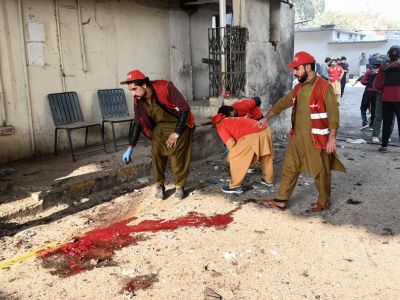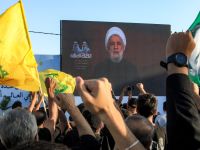Iraqi officials said Friday that US warplanes had attacked and destroyed a radar site in the southern Iraqi port city of Basra a day earlier, wounding a civilian.
"A radar station at the Basra airport was totally destroyed in a bombardment carried out at 1742 GMT by American and British airplanes," said a transport ministry spokesman quoted by the state INA news agency.
The spokesman said the US and British planes had taken off from bases in Kuwait and Saudi Arabia to "commit an odious new crime against civilian installations," pointing out that the radar was used for aiding civilian flights to take off and land, he said, cited by AFP.
A military spokesman later added that one person had been wounded in the raid.
The official said air defenses "forced the enemy planes to flee."
US officials said four F-16 jets conducted the night raid with precision-guided weapons at a field used by military and civilian aircraft in the bustling oil-shipping port, reported the Washington Post newspaper.
"The radar was not operating at the time, and it was far enough away from any civilian aircraft to prevent innocent casualties," one of the officials told the paper.
It was the third such strike against Iraqi air defenses in six days and was intended to try to stem Baghdad's increased efforts to shoot down US and British warplanes that have been patrolling two "no-fly zones" in Iraq for nearly a decade.
A brief announcement by the US military's Central Command in Tampa, which controls operations in the gulf region, said only that the warplanes had attacked "a military radar" in southern Iraq.
"The attack was against a radar at a combined military-civilian airfield near the city of Basra" about 300 miles southeast of Baghdad, one of the officials said.
US and British planes patrolling the no-fly zone in southern Iraq late Tuesday launched aerial strikes near the towns of Basra and Tallil.
Baghdad said the raid killed three and injured 15.
Almost daily clashes over Iraqi skies maintain tensions at a high level, 11 years after Washington led an international coalition that ejected Baghdad's forces from Kuwait.
A US spy drone went missing last Monday over southern Iraq, the first allied aircraft casualty since the 1991 Gulf war. A preliminary US investigation into the loss has produced no concrete results.
In comments published Wednesday, Foreign Minister Naji Sabri said: "We will fight American military aggression with all means.
"It is a legal right to defend our country," Sabri told Al Iqtissadi newspaper after Washington admitted the surveillance plane had gone missing.
"The aggressor planes will meet fire," AFP quoted him as saying.
Iraq has significantly boosted its air defense over the past year, mounting a serious challenge to the no-fly zones.
Sabri, nonetheless, added that Baghdad was ready to "reconsider relations" with Washington on condition that they were based on "mutual respect, the safeguard of national sovereignty and a fair treatment."
The United States, Britain, and France set up "no-fly zones" after the Gulf War. France left the coalition after the US and Britain bombed Iraq in December, 1998.
The UN has not authorized the no-fly zones, which are ostensibly there to prevent Iraqi attacks on Kurdish and Shiite Muslim minorities.
Iraq has from the beginning said the no-fly zones are illegal because no Security Council Resolution authorizes them, and because Iraq did not give up any territory in ceasefire agreements.
The US and UK maintain their warplanes at Incirlik airbase in Turkey, which in the last decade has carried out a large-scale war to maintain control over its own sizeable Kurdish minority – Albawaba.com
© 2001 Al Bawaba (www.albawaba.com)









